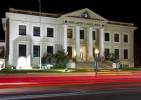Few licenses revoked in Nevada
Nevada is among the states with the fewest instances of teachers' licenses being revoked or denied because of sexual misconduct allegations, according to an Associated Press study.
Between 2001 and 2005, only 10 licenses from Silver State teachers were revoked or denied, ranking Nevada ninth among the states and Washington, D.C.
California, with a population more than 10 times Nevada's, led the nation with 313 such instances.
Education officials in Nevada lauded the statistics and cited them as evidence that the state's screening process for hiring teachers is keeping child predators away from the classroom.
But one education advocate criticized the state because more than 10 teachers were charged criminally with sexual misconduct in that time period.
She used Nevada's low rate of denying or revoking licenses as evidence that state officials aren't doing enough to keep teachers who victimize students away from classrooms.
"It presents a very dismal picture of Nevada," said Terri Miller, president of Stop Educator Sexual Abuse, Misconduct and Exploitation. The national nonprofit group is composed of volunteers.
Miller, who lives in Southern Nevada, successfully lobbied the Legislature to pass a law in 1997 that prohibits sex between school employees and 16- and 17-year-old students.
"With as many cases (of sexual misconduct against teachers) that have come to light and to only have 10 teachers lose their license, they (state officials) are not doing their job," Miller said.
According to Review-Journal research, Southern Nevada alone had 17 cases between 2001 and 2005 where teachers and substitutes at public and private schools were charged with some type of sexual misconduct. The most serious cases involved allegations that teachers had sex with students who were minors or forcefully groped students.
Two of the 17 cases were dismissed in court. Most of the cases involved instructors who were teaching for the Clark County School District. Additional cases during that time period involved district employees who were not teachers. Those cases were not included in the Review-Journal's research.
The AP study concluded that more than 2,500 teachers nationwide had their licenses revoked or denied between 2001 and 2005. Minors were the victims in at least 69 percent of those cases and most of the cases involved students.
Mary Armstrong, general counsel with California's Commission on Teacher Credentialing, supported Miller's contention that it's not necessarily bad if states have more instances where teachers' licenses were revoked or denied. She said the Golden State's high number of teacher license revocations and denials is a positive sign that her state is vigilant in protecting its students.
"California does a very good job monitoring teachers in the classroom and taking action against them when necessary," Armstrong said.
She said California has more than 330,000 teachers, so having 313 licenses revoked between 2001 and 2005 represents a small percentage of troubled teachers.
Nevada has about 23,000 licensed teachers, 15,000 of whom work in Clark County, which has the nation's fifth-largest school district.
Nevada Superintendent of Public Instruction Keith Rheault said the State Board of Education waits until cases are completed in the courts before teacher licenses are yanked.
"Everybody is innocent until proven guilty," Rheault said.
He also said private school teachers are not required by law to be licensed by the state. It was unclear how many of the 17 teachers who were charged criminally taught at private schools.
But as a whole, Rheault said Nevada's statistics are generally positive.
He said that unlike many states, Nevada's school districts require prospective teachers to have their fingerprints examined with databases from the FBI and local law enforcement agencies.
Fingerprints of applicants who apply for teacher positions in Clark County's public schools are checked by the FBI, Las Vegas police and the Nevada Central Crime Repository. Rheault said state school systems have been using those safeguards since the 1980s.
The state also has access to a database -- not available to school districts or the public -- that checks potential teachers' Social Security numbers with a database monitored by the teaching licensing directors of all 50 states.
This can determine if applicants have criminal records. The state's education office is responsible for teacher licensing.
Clark County schools Superintendent Walt Rulffes said the state and school district are doing a good job denying teachers who are criminals access to students.
He attributed the success to the collaboration among the district, the state and law enforcement agencies.
But Rulffes said even one case where a child is victimized by a teacher is too many.
"We want to be measured by having none of these instances occurring," he said. "There are entirely too many of these cases happening throughout the country."
Contact reporter Antonio Planas at aplanas @reviewjournal.com or (702) 799-2922.
STATE STATISTICS
States with the fewest teachers who had their licenses revoked, denied, sanctioned or surrendered from 2001 to 2005:
Hawaii....................... 0
South Dakota........... 1
Washington, D.C...... 2
Maine........................ 3
Virginia...................... 6
North Dakota........... 6
Mississippi................. 6
*Nevada..................... 10
*State with ninth fewest instances when teachers had their licenses revoked, denied or sanctioned.
States with most instances where teachers had their licenses revoked, denied, sanctioned or surrendered from 2001 to 2005:
California.............. 313
Texas...................... 204
Pennsylvania......... 132
Washington.......... 125
Florida................... 109
Oregon.................. 109
Source: The Associated Press























